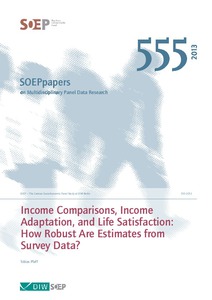Income comparisons, income adaptation, and life satisfaction: how robust are estimates from survey data?

Deutsches Institut für Wirtschaftsforschung, Berlin
DIW - Berlin
2013
44 p.
comparison ; evaluation ; income distribution ; quality of life ; statistics ; well being
SOEPpapers on Multidisciplinary Panel Data Research
555
Social protection
English
Bibliogr.
"Theory suggests that subjective well-being is affected by income comparisons and adaptation to income. Empirical tests of the effects often rely on self-constructed measures from survey data. This paper shows that results can be highly sensitive to simple parameter changes. Using large-scale panel data from Germany and the UK, I report cases where plausible variations in the underlying income type substantially affect tests of the relationship between life satisfaction, income rank, reference income, and income adaptation. Models simultaneously controlling for income and income rank as well as models with a number of income lags are prone to imperfect multicollinearity with consequences for the precision and robustness of estimates. When testing relative-income effects, researchers should be aware that reference income constructed as average of a rather arbitrarily defined reference group and reference income predicted from Mincer-type earnings equations are two approaches that can produce inconsistent results, and that are probably not as reliable and valid as previously assumed. The analysis underlines the importance of robustness checks and regression diagnostics, two routines that are often not carried out diligently in empirical research."
Digital
The ETUI is co-funded by the European Union. Views and opinions expressed are however those of the author(s) only and do not necessarily reflect those of the European Union or the ETUI.